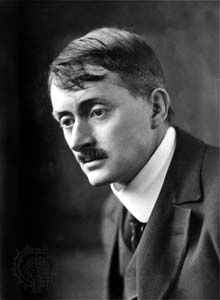Masefield, John
British poet
born June 1, 1878, Ledbury, Herefordshire, Eng.
died May 12, 1967, near Abingdon, Berkshire
 poet, best known for his poems of the sea, Salt-Water Ballads (1902, including “Sea Fever” and “Cargoes”), and for his long narrative poems, such as The Everlasting Mercy (1911), which shocked literary orthodoxy with its phrases of a colloquial coarseness hitherto unknown in 20th-century English verse.
poet, best known for his poems of the sea, Salt-Water Ballads (1902, including “Sea Fever” and “Cargoes”), and for his long narrative poems, such as The Everlasting Mercy (1911), which shocked literary orthodoxy with its phrases of a colloquial coarseness hitherto unknown in 20th-century English verse.Educated at King's School, Warwick, Masefield was apprenticed aboard a windjammer that sailed around Cape Horn. He left the sea after that voyage and spent several years living precariously in the United States. His work there in a carpet factory is described in his autobiography, In the Mill (1941). He returned to England, worked for a time as a journalist for the Manchester Guardian, and settled in London. After he succeeded Robert Bridges as poet laureate in 1930, his poetry became more austere.
Other of Masefield's long narrative poems are Dauber (1913), which concerns the eternal struggle of the visionary against ignorance and materialism, and Reynard the Fox (1919), which deals with many aspects of rural life in England. He also wrote novels of adventure—Sard Harker (1924), Odtaa (1926), and Basilissa (1940)—sketches, and works for children. His other works include the poetic dramas The Tragedy of Nan (1909) and The Tragedy of Pompey the Great (1910), as well as a further autobiographical volume, So Long to Learn (1952). Masefield was awarded the Order of Merit in 1935.
Additional Reading
Constance Babington Smith, John Masefield (1978, reissued 1985), is a biography.
- free trade
- free-trade zone
- Free University of Berlin
- free verse
- free will
- freezing
- freezing nucleus
- freezing point
- Frege, Gottlob
- F region
- Freiberg
- Freiburg, Albert Ludwig University of
- Freiburg im Breisgau
- Freidank
- Freie Bühne
- Frei, Eduardo
- Freifrau von Krüdener, Barbara Juliane
- Freifrau von Suttner, Bertha
- freight car
- Freiherr (baron) von Ehrenfels, Christian
- Freiherr (baron) von Manteuffel, Edwin
- Freiherr (baron) von Soden, Hermann
- Freiherr (baron) von Vogelsang, Karl
- Freiherr (Baron) von Wolff, Christian
- Freiherr Mack von Leiberich, Karl